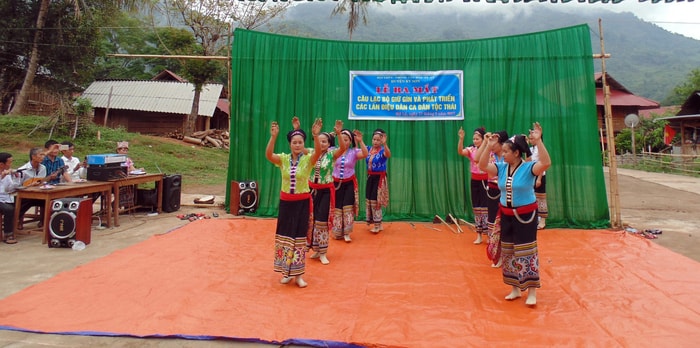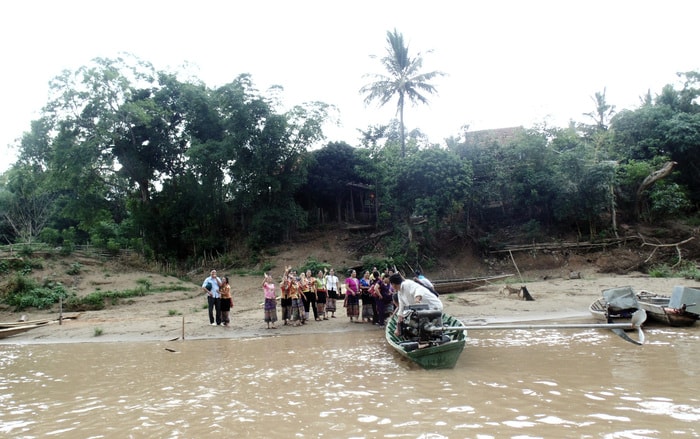Folk song by the ancient tower
(Baonghean) - On a summer morning, the Nam Non River is red with floodwaters. And the folk song resounds as if coming from a faraway land. The waves are as fierce as they are passionate and endless.
Yen Hoa village is like a handkerchief embroidered with floral motifs on the banks of the Nam Non River. The river originates from the Land of a Million Elephants, and has passed through countless villages in Laos and Vietnam. I guess that perhaps there are few villages along the hundreds of kilometers of the river that are as strange as this.
 |
| Thai Folk Song Club of Yen Hoa village performs. Photo: Huu Vi |
“Sit tight. The water is very strong,” the boatman on the Nam Non River warned us as we left the boat dock next to the My Ly Commune People’s Committee a short distance away. The distance from Xieng Tam village, the commune center, to Yen Hoa village only takes more than ten minutes by motorboat, but it is enough to make those who are not used to the waves here feel a little scared. For the past few days, it has been raining heavily upstream, and the water has been pouring down in a torrential manner as if the river was angry and sulking.
Our wandering steps took us to My Ly. Luckily, we met a group of district officials who came to this border area to attend the opening ceremony of a Thai folk song club. To be honest, for a long time, folk songs have lived in the spiritual life of many generations of people in the border villages of My Ly commune. Yen Hoa village is no exception. I once heard an old woman in Yen Hoa sing: "Coming here, there is no wide road, but the songs are everywhere, the songs always bring joy to the village". So today there is a folk song club? Whether there is a club or not, folk songs have lived and will live well in the cultural activities of the village community.
Several times I visited Yen Hoa village simply to admire the ancient tower. An architectural work completely foreign to the Thai stilt houses. It creates a special attraction with speculations about the life of the tower. People think it is the Buddhist architecture of the Lao people. Others say that in the past there was a rich and powerful kingdom here. Next to the tower is a Bodhi tree, a symbol of Buddhism. I heard that the Bodhi tree was planted when the tower was built but it died and the current tree is the third generation. They grow, age and die like the law of the wheel of reincarnation. The brick tower stood here before Yen Hoa village was established. I heard that in the past, in Xang Nua village, the commune center is Xieng Tam village, there were also large and small towers. Then after the August Revolution, they were destroyed. The bronze statues placed in the tower were all stolen. The tower itself in Yen Hoa village was also damaged, more or less the Buddha statues were also stolen.
It was also a fortunate coincidence that the Thai people chose to build a village next to the tower. They believed that it was sacred land, and settled here to both “guard” the sacred tower and avoid disasters and diseases. It was not by chance that the ancients chose to build the tower there.
 |
| Farewell on the riverbank. Photo: Huu Vi |
The rain gradually became heavier, but the yard in front of the Yen Hoa village cultural house was still crowded with people. Most of them were villagers who came to see the launch of the folk song club. It turned out, unlike my initial thoughts, for them, a club to gather people who love Thai folk songs in a group is also very important. Welcoming us from the boat dock, Mrs. Vi Thi Dan laughed and said: "There are many people who sing folk songs, but we have waited a long time for a club to be established to learn together. So it can be considered an important event in the village. When I heard about it, I immediately signed up to join."
In the rain, on the stage that was set up roughly and rustically, the performances still took place innocently like a night of performances that we often encountered on our trips back to the mountains. The audience, some sat inside and looked out, some sat right on the rows of chairs placed next to the stage, but everyone was engrossed, despite their clothes and hair being wet with rain. A rare sight. In a remote place, people still had access to satellite television. They were familiar with well-invested music programs, good movies, TV game shows, etc. However, when a folk song was played, the whole group did not mind braving the rain to listen with fascination.
The Thai folk song club's launch program was shortened because the weather was not favorable. At this time, the festival really began. In the space of the village cultural house, folk songs resounded. Around the family meal on the happy day of reunion, the women started the flirting singing. In a moment, they became real improvisational artists. One side was female, the other side was male, responding back and forth. All were beautiful words and meanings: Why didn't you say you loved me when you were twenty/When the moon and the stars rose in the late afternoon/Your right foot and left arm were still equally strong... The male side immediately responded: When I was young, I went to trade in the Laotian Muong/ When you were still a girl, I was still worried about finding good wood to build a house/ When you were old, you went to your husband's house...
Each good duet received applause. And the singing contest continued until the sun began to appear. At this time, the sun had completely set in the west. We sang our farewells again: Go home, don't let the rain fall on your way to the market village/ Don't let the Kinh people get sick/ Pity the villagers who are waiting with tears in their eyes.
I knew that those were just love songs, a very normal cultural and spiritual activity. But when I got on the boat, looking back at the group of people seeing us off, I knew that those were truly unforgettable words. The hospitable villagers here really wanted us to return. The Nam Non River still flowed. And it seemed that somewhere in the sound of the waves lapping against the boat, there were folk songs.
You Wei
| RELATED NEWS |
|---|
